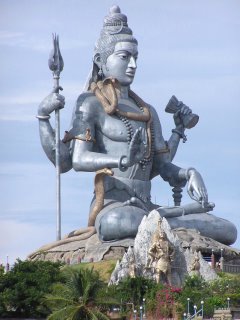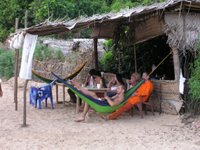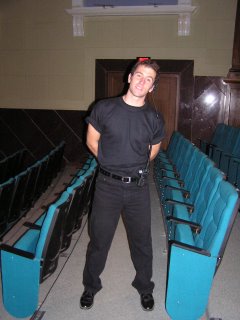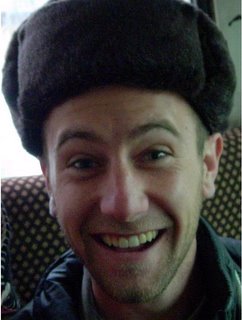Murudeshwar-- a very big Shiva (and Gokarna, and birthday)
Written Nov. 26, 9:30 am.
__________________________________________________________
Murudeshawar
I am about to leave Murudeshwar (pronounced more like Mudeshwar), a town south along the coast from my last destination, Gokarna. I am here for a few reasons, the principle one being that it isn't mentioned in my travel guide (the Lonely Planet). It came to my attention because an Indian fellow I talked with recommended it, and it happened to be on my way southward, but the reason I decided to get off the bus as it stopped briefly on a highway that passed nearby was that I hadn't yet escaped from the destinations listed in the Lonely Planet. I thought doing might give me a chance to get a glimpse of India as it exists outside the world of Western tourists.
Indeed this proved to be the case. During my stay, the only other people I saw who appeared to be Westerners were a single European couple that I passed in the street. This is not, however, to say that Murudeshwar doesn't have its fair share of tourists; in fact it appears to be more or less a town built upon tourism. It's just that they almost exclusively get Indian tourists. It turns out that this place has a giant Shiva statue, which I remembered the Indian fellow who made the rec. to visit having mentioned once I saw it-- towering over the town and surrounding landscape--from where I got off the bus, about a mile away. In fact this Shiva statue is claimed by the town to be the "World's Largest," and I can believe it (especially since there aren't likely contenders outside India . . . ). Though I've never myself seen the Statue of Liberty, I'm tempted to say that it is of similar proportions, perhaps a bit smaller (though I'd still put my money on Shiva in a fight: he has 4 arms--one holding a mean-looking trident-- and is, afterall, the destroyer of the universe). In any case, this monument is definitely the less tall of the two, as Shiva sits in the hyper-cross-legged lotus position. Even so, the sheer size of this thing is impressive.
So why no Western tourists? Or, in other words, why don't the guide books include it? After my experience with Let's Go this summer I feel comfortable saying that it's partly arbitrary, what gets included in travel guides. In the Lonely Planet, most smaller destinat
 ions get lumped in the "Around X-major city" sections, and it isn't really "around" any major cities. As for why this isn't a must-see for all foreign visitors, as a relatively recent construction, it has an undeniable campiness. There's a small kind-of campus surrounding Shiva with a host of other, smaller statues, and as a whole the thing looks a little piece of Disneyland developed around Hindu gods instead of Mickey and friends.
ions get lumped in the "Around X-major city" sections, and it isn't really "around" any major cities. As for why this isn't a must-see for all foreign visitors, as a relatively recent construction, it has an undeniable campiness. There's a small kind-of campus surrounding Shiva with a host of other, smaller statues, and as a whole the thing looks a little piece of Disneyland developed around Hindu gods instead of Mickey and friends.I walked around the grounds maybe 15-20 minutes. Nearly all the rest of the afternoon I spent wandering, first about the streets of the town and then later through the surrounding farmland. Most everywhere I went, I was something of a spectacle: people stopping, staring, pointing, coming out of houses to look at me. I greeted everyone as warmly as I could, and at this most transformed blank stares into big smiles and returned the gesture. Not once did someone hound me to buy something or give them money. Not once! I can recall a beggar or two, but they weren't aggressive, and there were a few men trying to push their postcards at the base of the Shiva, but one polite "no thanks" was enough. Twice in my wanderings I had the opportunity to accept offers from nice fellows on passing motorbikes to ride as the third (in India motorbikes seat three and bicycles seat two, which isn't to say either is made differently than we in the States are used to). Generosity, extended in my direction!! While I certainly felt a little strange causing such a commotion everywhere I went, on the whole I was ecstatic with how differently I was being treated from most places in India that I have been thus far.
What I'm not sure of yet is how much this difference I encountered might be in part due to religious influence: I discovered as I walked through the town--from a man originally from Dubai with perfect English-- that Murudeshwar is 70% Moslem (and only 20% Hindu, with 10% of the population Christian). So in that sense I presume this town isn't representative of the rest of India, which is about 80% Hindu and 12% Moslem according the Lonely Planet. Whether Indian Moslems conduct themselves differently from their Hindu neighbors, I don't yet know. My sense is that they don't, and I suspect that my experience would have been much the same if Murudeshwar was entirely Hindu. But, even the notion of being surrounded by Moslems gave me the chance to reflect upon the respect I gained for Islam during my time in Syria, replacing vaguely negative associations that I kind of knew I probably shouldn't hold with genuinely positive sentiments. Which isn't to say that I prefer Islam to Hinduism, or anything of the sort. I will say, though, that while I feel I have at least some understanding of Islam, Hinduism continues to be a perplexing thing to me, though I know a fair number of facts about it. It just feels so different from what I've known, and so complex-- there are, according to the Lonely Planet (again) 330 million Hindu gods. What does that even mean? And, of course, I don't have an already immersed, local-language-speaking guide to the people and culture, as Rich was for me in Syria. (English gets me by, but only at a basic level. There's rarely opportunity for conversations of substance with locals.)
More beach
Prior to my arrival in Murudeshwar (and following my time in Hampi), I spent another 3 days on the beach, more than I expected after my experience of it in Goa. I decided to go this beach largely because it seemed as good a way as any to get back to the coast and continue southward. It sounded like it might be an improvement over Goa, since (a) the town is a major Hindu pilgrimage site, and (b) the beaches were far less developed. Also, my Israeli pal from Hampi, Danny, was headed there. So I thought I might spend a day and then be on my way.
A few things conspired to prevent this. On my overnight sleeper bus from Hampi to Gokarna, I made friends with a British couple and a Dane, with whom I then traveled to the beach upon our arrival at 4 something in the morning. We ended up at this place with ultra-basic huts very much like the huts lived in by many coastal-
 living Indians-- a bamboo frame and palm frawn walls directly on sand-- and so in my mind far more authentic than the more plush huts I had found in Goa. The beach was mostly unoccupied (though a huge resort is about to open very close, which will certainly change the whole feel of the place), felt remote (also perhaps not for long), and was generally stunning--hands down more so than anywhere I saw in Goa. Many of the huts were occupied by semi-permanent residents (six month visas being the limiting factor in permanency) who formed something of a small, pleasantly inclusive community. In fact, with encouragement from my new companions from the bus, they threw me a semi-surprise birthday party on the evening of my arrival (the 22nd, which still felt kind of like my birthday since I didn't really sleep on the bus the night before). The Indians who owned and ran the place were really great, and they made the best food I've had in India. All around, there was a lot to like.
living Indians-- a bamboo frame and palm frawn walls directly on sand-- and so in my mind far more authentic than the more plush huts I had found in Goa. The beach was mostly unoccupied (though a huge resort is about to open very close, which will certainly change the whole feel of the place), felt remote (also perhaps not for long), and was generally stunning--hands down more so than anywhere I saw in Goa. Many of the huts were occupied by semi-permanent residents (six month visas being the limiting factor in permanency) who formed something of a small, pleasantly inclusive community. In fact, with encouragement from my new companions from the bus, they threw me a semi-surprise birthday party on the evening of my arrival (the 22nd, which still felt kind of like my birthday since I didn't really sleep on the bus the night before). The Indians who owned and ran the place were really great, and they made the best food I've had in India. All around, there was a lot to like.And yet, despite all this, after about another day and a half on the beach, I'd had enough. Though in every sense an improvement from Goa, my experience at Gokarna in the end still felt very much like the product of
 that contrived Western fantasy, if of a slightly different sort. Most the residents lounged about through the day in hammocks, dipping in the ocean now and again, and partied all night, all the while being waited upon by the Indians. As we stayed longer there grew something of a rift between me and my European pals, as they expressed feelings along the lines of, "I need to stay at least another week here, maybe two." My own mindset was moving more and more towards, "If I don't get out of here by Friday I'm going to start breaking things." Like in Goa, I just felt like there is just too much to see and experience in India to be spending day after day sitting on the beach. I guess a big part of it is that I've never really been able to enjoy sitting on the beach all day-- I get bored and discontent quickly. I prefer to do something, even if it's just roaming . . .
that contrived Western fantasy, if of a slightly different sort. Most the residents lounged about through the day in hammocks, dipping in the ocean now and again, and partied all night, all the while being waited upon by the Indians. As we stayed longer there grew something of a rift between me and my European pals, as they expressed feelings along the lines of, "I need to stay at least another week here, maybe two." My own mindset was moving more and more towards, "If I don't get out of here by Friday I'm going to start breaking things." Like in Goa, I just felt like there is just too much to see and experience in India to be spending day after day sitting on the beach. I guess a big part of it is that I've never really been able to enjoy sitting on the beach all day-- I get bored and discontent quickly. I prefer to do something, even if it's just roaming . . .The problem was, the town was an hour walk away from where we were staying, and since most booking has to be done in advance (at least for the trains, which I expected to take), it took me several days to get out of there. But, this was okay in that the walk to town, over headlands and along other beaches, was spectacular. And the town itself felt distinctly Indian and not overrun by tourists. In the end my trips were unnecessary, as I cancelled my train reservation and caught a bus instead, realizing that the particulars of train travel from Gokarna would be a headache. Once this decision had been made, I realized that this would allow me to stop easily enough in Murudeshwar, and so I decided to go for it.
Having seen how great the absence of tourism can be, I think I may continue to stop in small towns unmentioned in the Lonely Planet during the remainder of my stay. I'm considering going to Sringeri tonight, another town circled in the Lonely Planet. It gets a brief description in the "Around Mangalore" section; though brief, it makes the town sound pretty cool.
--Josh
_______________________________________________________
A note about that birthday of mine, as per request: I wrote up in my journal part of what was to be a post of the events of my birthday in Hampi (and then on the sleeper bus). But an entire entry for one day was more space than the days events merited. So, briefly: I had quite a nice day. I didn't worry too much about the fact that it was my birthday, though I didn't ignore it entirely, either. I started the day visiting the remaining temples/ruins of Hampi, which included a really cool one on top of a big Hillock with great views overlooking some of the other sights. I had lunch at a restaurant called the Mango Tree, where I ate almost every day I was in Hampi because the food was pretty good and the atmosphere was a contender for best I've ever seen (outdoor terraces facing out over the river, beneath a giant mango tree).
From there I went in search of some waterfalls a little ways outside of town that I'd heard about, which proved to be really cool. Though most hire guides to show the way because it is supposed to be quite difficult to find, I decided, tired of the various sights where you just show up and look, that I would find them myself or not find them at all. With some good luck and occasional directions from locals, I was able to make my way through the various banana farms, marshland, and rocky slabs to the waterfalls. Though uncertain of what to expect, these waterfalls turned out to be among the most interesting water features I've seen: in the middle of a big rock clearing, the waterfalls are a series of half underground cascades. The water rushes beneath and between piled boulders, so to get down to the water I had to scramble down through the rocks. You could never see very much of it at once, which is why I think I enjoyed it so much. I say waterfalls because there were two, one after the other with a pool between. After the second, there was another pool, which then disappeared entirely underground, resurfacing only a kilometer or so later. It's difficult to explain, and probably pretty boring to read, so I won't elaborate much more. In short, it's the sort of thing that gets me excited, so I really enjoyed being there. Especially since I was able to find it without paying someone to just show me-- it made it so that it didn't feel like the sightseeing I described previously. I ended up staying a good while longer than I expected, such that as soon as I got back I had to go catch my bus to Gokarna. So that's my birthday-- nothing too wild, but a good day to be sure. Looking forward to celebrating the ability to drink legally in the US upon my return . . .






